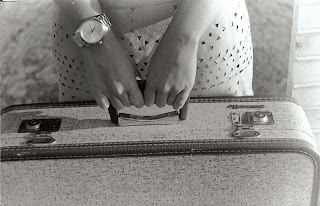Here's an article about the project from the UVU Review:
“Eurydice” invites confrontation of difficult feelings
An old bicycle, a battered mailbox and a discarded tennis racket hung as if suspended in the faint mist that filled the Noorda Theater. Each item was stark white, as if all color had been drained.
The eyes of about 60 audience members, in the intimate setting of the Noorda, were riveted on the actors throughout the 80-minute showing of “Eurydice” Monday evening, Oct. 17.
Prior to the show, attendants lounged in the foyer reading dozens of letters contained in the “Dear Eurydice Project.” These letters, addressed to loved ones lost, ranged from sentiments to friends who had taken their lives long ago to letters almost scolding fathers who chose not to stay connected with their children. Despite the somber setting created by the letters in the art project, playwright Sarah Ruhl was able to lace a little bit of humor into her interpretation of the story of Orpheus and Eurydice.
Collin Thomas (left) and Cameron Garcia (right) read silently from the letters submitted to the "Dear Eurydice Project"
According to dramaturge Wendy Gourley, the contrast between sorrow and humor were meant to represent reality. Gourley, who was responsible for providing the director with research and background of the story, explained that Ruhl’s interpretation of the traditional Greek story was her way of dealing with the death of her father.
“She wanted one more conversation with her dad, and the play was a way for her to have that,” Gourley said.
The story is traditionally told from the perspective of Orpheus, Eurydice’s husband. Ruhl’s version, however, was centered around Eurydice, who during the course of the play had a chance to see her father in death, and get to know him in ways she never did in life.
Society, Gourley explained, doesn’t contain rituals through which loss can be adequately grieved the way that in can be through works of theater. This performance, if it didn’t provide audience members with a tool to deal with grief, it at least gave them the opportunity to approach any feelings of loss in an open-minded way. Feelings that Aubrey Bench, who played Eurydice, explained as universal.
“Everyone’s lost someone or something,” Bench said, “so this play is accessible for everyone because everyone’s gone through these emotions at one point or another.”
After the conclusion of the show, audience members were able to interact with the cast, crew and director in a question and answer session they called a “talkback.” This unique addition to the performance will only be available after the Oct. 29 matinee and the Nov. 4 evening performance.



No comments:
Post a Comment